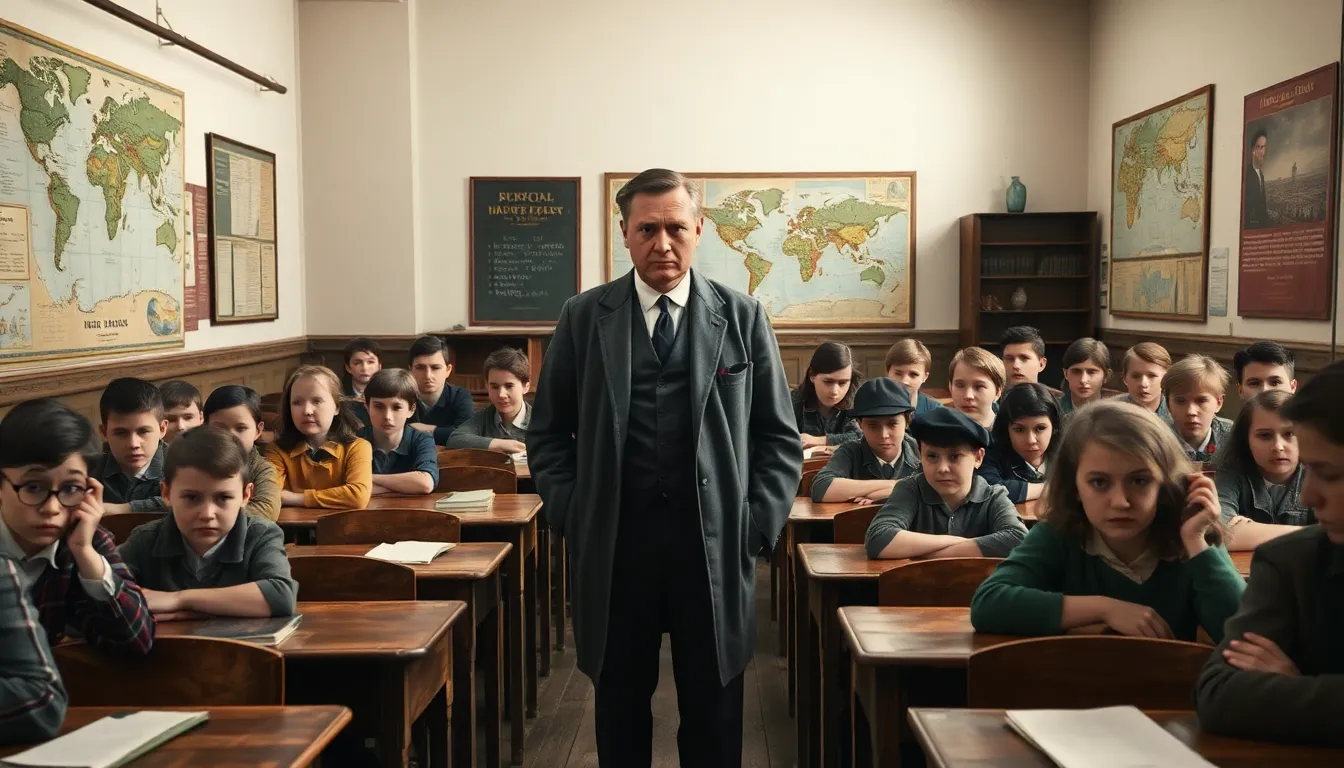Table of Contents
ToggleIn the realm of historical narratives, few figures evoke as much intrigue as Adolf Hitler. The exploration of his formative years sheds light on the influences that shaped his ideology and ambitions. “L’élève Hitler ou l’école de la trique” dives into the lesser-known aspects of his education, examining how his experiences in school contributed to the man he would become.
This analysis reveals the harsh realities of his upbringing, where discipline often took precedence over creativity. The rigid environment not only molded his character but also laid the groundwork for his future beliefs. By understanding these early influences, readers can gain valuable insights into the complex interplay between education and personal development, ultimately shaping one of history’s most notorious figures.
Overview of “L’Élève Hitler Ou L’École De La Trique”
“L’Élève Hitler Ou L’École De La Trique” delves into the formative years of Adolf Hitler, highlighting how his educational experiences shaped his worldview. The narrative examines the German educational system of the early 20th century, marked by strict discipline and an emphasis on obedience. Teachers employed severe methods to instill conformity in students, leaving little room for creative expression.
The book illustrates specific instances from Hitler’s schooling that contributed to his developing ideology. Authoritative figures frequently reinforced a militaristic and nationalistic ethos, which resonated with Hitler’s later political aspirations. These educational encounters laid foundational beliefs that would influence his decisions in adulthood.
The text further explores the social dynamics within the classroom and broader societal expectations. Peer interactions fostered a sense of rivalry, while cultural narratives surrounding German identity reinforced nationalist sentiments. The analysis underscores that these experiences collectively influenced Hitler’s future ambitions, illustrating the critical connections between education and personal ideology.
Themes Explored in the Book

The book examines significant themes related to Adolf Hitler’s early life, focusing on how education shaped his ideological framework. Key aspects include the influence of schooling on his beliefs and the dynamics of authority and violence within the educational system.
The Impact of Education on Ideology
Education played a crucial role in forming Hitler’s ideology, fostering a mindset that valued conformity over creativity. The rigid structure of the German educational system emphasized obedience and respect for authority. Through indoctrination in subjects that promoted nationalism, young Hitler absorbed ideas that fueled his future ambitions. Classroom experiences, particularly interactions with teachers who espoused militaristic values, reinforced his fascination with power and dominance. These formative years created a foundation where extreme ideologies took root, illustrating the intricate relationship between education and the development of personal beliefs.
Violence and Authority in the Classroom
Violence and authority characterized much of Hitler’s educational experience, forming a significant theme within the narrative. Teachers employed authoritarian methods to maintain control, often resorting to physical punishment and intimidation. This atmosphere of fear cultivated a culture of submission among students, simultaneously breeding rivalry and aggression. The normalization of such violence instilled in Hitler an acceptance of harsh measures as legitimate means of asserting control. The pervasive influence of authoritative figures within this context not only shaped his worldview but also laid the groundwork for the tyrannical governance he later enacted. The book explores how these early encounters with authority and violence influenced his understanding of power dynamics in society.
Character Analysis
This section analyzes key figures in “l’élève hitler ou l’école de la trique,” focusing on their roles and influences within the narrative.
Protagonist’s Journey
Adolf Hitler’s journey in the story reflects a complex interplay of ambition, conformity, and rebellion. His experiences in a rigid educational environment shaped his worldview and instilled a deep-seated desire for recognition. Faced with authoritative figures that emphasized obedience, he navigated challenges that ultimately fueled his aspirations. The harsh discipline he encountered not only conditioned him to accept authoritarian rule but also motivated his later endeavors in politics, where he sought to assert his own control and envision a new order.
Supporting Characters and Their Influence
Supporting characters play vital roles in shaping Hitler’s trajectory and perspective. Key figures include teachers, classmates, and mentors, each contributing to his understanding of power and societal expectations.
- Teachers: Authoritarian educators reinforced rigid discipline, instilling a culture of fear that normalized violence and dominance. Their methods influenced Hitler’s acceptance of aggressive leadership as a legitimate means to achieve goals.
- Classmates: Peer interactions fostered rivalry, pushing Hitler into a position where competitiveness became paramount. These dynamics contributed to his eventual beliefs in meritocracy and social Darwinism, which justified his aggressive political tactics.
- Mentors: Influential adults provided ideological frameworks that resonated with Hitler’s nationalistic sentiments. Figures who promoted militarism and nationalism solidified his fixation on a unified German identity.
Collectively, these supporting characters played crucial roles in establishing a foundation for Hitler’s extreme ideologies, demonstrating how external influences during formative years interact with individual ambition.
Historical Context
The historical context surrounding Adolf Hitler’s education reveals a complex backdrop that influenced his ideological development. This section explores the setting of pre-war Germany and the educational system that shaped his beliefs.
The Setting of Pre-War Germany
Pre-war Germany experienced significant political and social upheaval. The aftermath of World War I left a nation grappling with economic hardship and a sense of national humiliation. The Treaty of Versailles (1919) imposed heavy reparations, instilling resentment among the populace. Political instability, punctuated by the rise of extremist movements, provided fertile ground for nationalist ideologies. Amid this turmoil, Hitler’s formative years reflected a society eager for a resurgence of pride and unity, conditions that bred acceptance of authoritarian rhetoric.
Educational System and Its Role in Shaping Beliefs
The German educational system of the early 20th century emphasized strict discipline and conformity. Educational institutions prioritized obedience, aligning with militaristic values pervasive during that era. Curated curricula included subjects that reinforced nationalist sentiments and glorified the German state. Teachers, often authoritarian in approach, employed rigid methods that instilled fear and submission among students. This environment normalized aggression while fostering a culture of competition.
Specific instances in Hitler’s schooling highlight this dynamic. For example, prevalent corporal punishment exemplified the acceptance of violence as a means of discipline. Such experiences planted the seeds of extreme ideologies within him. The synergy between authoritarian educators and an environment ripe for national pride shaped Hitler’s worldview. Peer interactions accentuated rivalries, further embedding notions of superiority and meritocracy. These elements collectively constructed a psychological framework that would later manifest in his political ideologies and actions.
Critical Reception
The reception of “l’élève hitler ou l’école de la trique” generates diverse perspectives highlighting both its merits and areas of contention. Critics and scholars have provided insights that enhance understanding of the text’s impact and relevance.
Positive Reviews and Highlights
Positive reviews underscore the book’s thorough exploration of Adolf Hitler’s formative years and the interplay between his education and ideological development. Reviewers commend the author’s detailed examination of educational practices, noting how it persuasively illustrates the environments contributing to Hitler’s worldview. The narrative’s clear correlation between authoritarian teaching methods and the normalization of violence garners praise, as it provides an essential historical context for understanding extremist ideologies. Additionally, the book’s engagement with the socio-political backdrop of early 20th-century Germany resonates with readers seeking to comprehend the complexities that shaped Hitler’s beliefs. Scholars also appreciate the rich analysis of peer interactions in Hitler’s school environment, emphasizing how competition among students reinforced emerging nationalist sentiments.
Criticisms and Controversies
Criticisms of the book primarily address its portrayal of education as the singular catalyst for Hitler’s later ideology, which some argue oversimplifies a multifaceted issue. Critics point out that while the text identifies significant influences, it may underrepresent the broader societal factors, including familial dynamics and socio-economic conditions. Furthermore, a segment of readers expresses concerns over potential determinism in linking educational experiences directly to extremist ideologies, emphasizing the need for a more nuanced discussion. Controversies surrounding the use of Hitler’s early life as a focal point for broader societal critiques also emerge, with some questioning whether such an approach risks trivializing the complexities of historical events.
The exploration of Hitler’s early education reveals profound insights into how formative experiences can shape ideologies. The strict discipline and authoritarian methods prevalent in the German educational system played a pivotal role in molding his beliefs. This analysis underscores the critical connections between education and personal development, particularly in the context of extreme ideologies.
By examining the interplay between rigid schooling and societal influences, it becomes evident that Hitler’s environment fostered a mindset that valued conformity and obedience. Understanding these dynamics offers valuable lessons about the potential consequences of educational practices and the importance of nurturing critical thinking and creativity in future generations.






